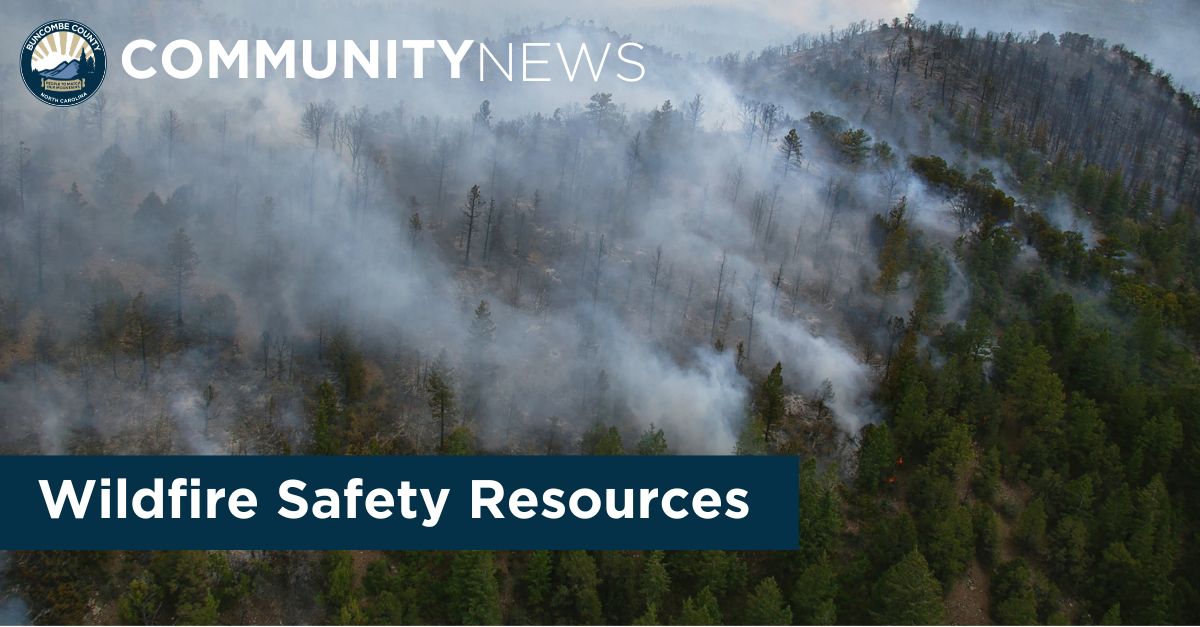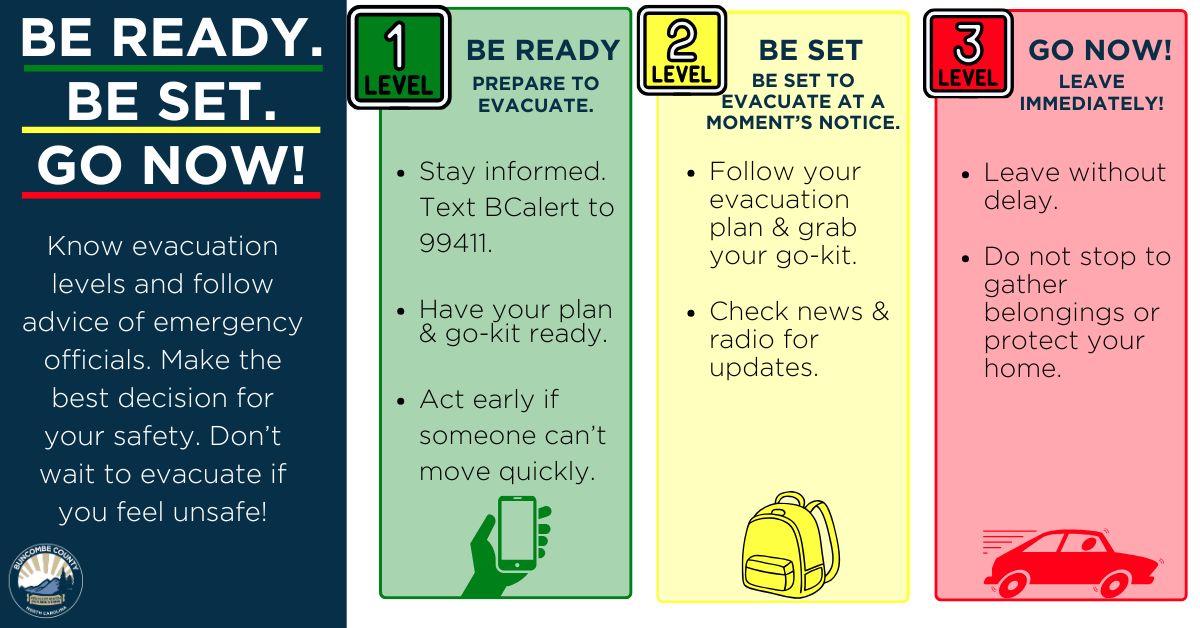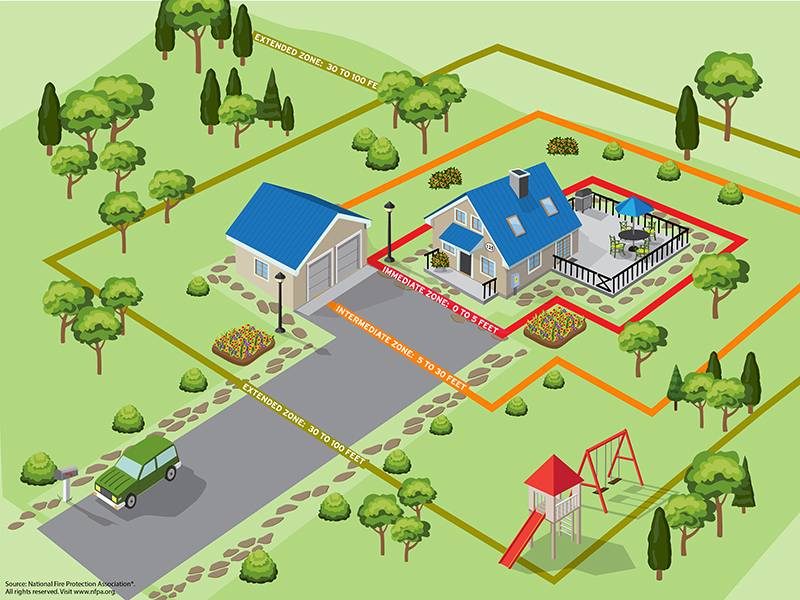This news item expired on Saturday, February 7, 2026 so the information below could be outdated or incorrect.

Spring is wildfire season in WNC and this year storm debris poses an increased risk for the region. However, there are several simple steps residents can take to mitigate wildfire risk around their homes. Check out the resources below for home and lawn maintenance guides, fire risk self-assessment tools, and more.
Always be prepared to evacuate during wildfire season. There are currently no evacuation orders in Buncombe County.


Ready - Set - Go
In the case of evacuation orders, a map will be shared detailing the evacuation level for different areas of the county. Get familiarized with the levels:
 Level 1 (Green on a Map) - BE READY to evacuate.
Level 1 (Green on a Map) - BE READY to evacuate.
Be aware of danger in the area. Stay informed: Sign up for emergency alerts by texting “BCAlerts” (not case sensitive) to 99411. Follow Buncombe County Government on social media. Tune in to local news for more information. This is the time to pack and prepare to leave. Have your emergency plan and go-kit ready. Plan possible evacuation routes and transportation needs. Check with loved ones and emergency contacts. If you can do so safely, check with your neighbors, share information and ask for help if needed. Consider leaving early if you or your loved ones can't move quickly and need more time to evacuate, including older adults, families with children, pets, people with disabilities, and those with limited access to transportation. Consider moving pets and livestock early.
 (Yellow on a Map) Level 2 - BE SET to evacuate. This includes voluntary evacuation alerts.
(Yellow on a Map) Level 2 - BE SET to evacuate. This includes voluntary evacuation alerts.
There is significant danger in the area. A voluntary evacuation alert may have been sent to your area. Be prepared to leave at a moment’s notice. Time to act - there may not be enough time to pack your belongings and doing so is at your own risk. Leave if you or your loved ones can’t move quickly and need extra time to evacuate. Inform loved ones of your evacuation plans. Make plans for pets. Be prepared to relocate to a shelter or with family or friends outside of the affected area. Stay informed and be alert. Sign up for emergency alerts by texting “BCAlerts” (not case sensitive) to 99411 for latest updates and information on shelters. Continue to check the Buncombe County website, local emergency services on social media, and local news for updates. Conditions can change rapidly. Leave if you feel unsafe. You don't need to wait for another evacuation notice.
.png) (Red on a map) Level 3 - GO NOW!
(Red on a map) Level 3 - GO NOW!
Leave immediately! There is extreme danger in the area. It is unsafe to stay and threatens the safety of you, your loved ones and emergency responders. Do not stop to gather belongings or make efforts to protect your home. Emergency responders may not be available to provide help if you choose to stay. Do not return to the area until officials announce the area is safe.
Download and share a Ready - Set - Go and Wildfire Prevention flyer below.
Home Maintenance and Prevention
Fire-Resistant Landscaping in NC
This NC State Extension publication includes guidelines for creating and maintaining a fire-resistant landscape around your home, including plant flammability ratings for use in landscaping and maintenance decisions.
Fire Safety Outdoors
NC Forest Service shares guides on debris burning, land management, tool use, outdoor cooking, heaters, campfires, and more.
Homeowner Fire Risk Self-Assessment
Use this assessment from the NC Forest Service to determine your home’s wildfire risk rating.
FireWise Resources
Explore a variety of resources to assist homeowners, program participants, and other wildfire stakeholders as they travel down the path to wildfire risk reduction. Find detailed guides on current research regarding different components of the home, their vulnerabilities, and recommendations to reduce risk.

Preparing Homes for Wildfire
The above image shows the "ignition zones" surrounding a home and landscaping and maintenance best practices to prevent fire spread from radiant heat. Learn more about the steps you can take in each zone.
Southeast Wildfire Retrofit Guide
This guide covers regional building styles and construction materials, common topographical characteristics and weather patterns, and other risk factors identified by fire science research and was developed by the Insurance Institute for Business and Home Safety.
Understanding the Wildfire Threat to Homes
This online learning module by FireWise is an overview of fire history, fire basics, and how homes burn. Learn the basics of how wildfires ignite homes and the actions that can be implemented to make homes safer. The module can be completed in approximately 30 minutes.?Este vídeo también está disponible en español.
Southeastern Guide to Fire Adapted Communities
This comprehensive guide details local wildfire preparedness at all levels. The Guide to Southeastern Fire Adapted Communities was adapted from the original National Fire Protection Association’s Guide to Fire Adapted Communities by the Southeastern Regional Cohesive Fire Strategy Coordinator, Southern Regional Extension Forestry, Southern Governor’s Association, and the USDA Forest Service.
Forestland Management
Emergency Forest Restoration Program
The Farm Service Agency helps nonindustrial forested landowners recover from natural disasters. This program provides funding and technical support for practices that restore forest health, mitigate further damage, and encourage sustainable forests. Contact Charles Zink of the Madison/Buncombe FSA Office by calling 828-649-2712 Extension 2 or emailing at charles.zink@usda.gov.
Environmental Quality Incentive Program (EQIP)
Through this program, the USDA's Natural Resources Conservation Service provides technical and financial assistance to agricultural producers and forest landowners to address natural resource concerns, including forest management, invasive management, and implementation of forest management practices. Contact Kayla Martineau via email at kayla.martineau@usda.gov or via phone through the NRCS Asheville Service Office at 828-254-0916 Ext. 3.
NC Registered Foresters
This list can help you find assistance with forest management on private property. Individual landowners can hire private foresters to create a plan or implement forest management practices on their private property.
You can also contact the NC Forest Service for forest management plans and technical assistance. Get in touch with the Buncombe office at 828-686-5885 or Buncombe.ncfs@ncagr.gov.
Fire Monitoring
North Carolina Daily Fire Danger
This map shows today's expected fire danger across North Carolina.
NC Forest Service Wildfire Public Viewer
This web viewer provides current information on North Carolina’s reported and active wildfires. Wildfires that are controlled or out are not shown.
Organizations Supporting Community Fire Adaptation
North Carolina Forest Service
The NC Forest Service's primary purpose is to protect, manage and develop the forest resources of the state. Programs include reforestation services, forest fire prevention and suppression, and insect and disease control. They offer free home and community wildfire risk assessments, mitigation planning, and community presentations.
Mountain Valleys Resource Conservation & Development Council
This organization is a 501(c)3 nonprofit whose programs include streambank restoration, energy capture, wildfire mitigation, and watershed protection.
Southern Blue Ridge Prescribed Burn Association
This community-based organization focuses on increasing access to prescribed fire on private lands to benefit the Southern Blue Ridge mountains. Members of the Southern Blue Ridge Prescribed Burn Association include anyone interested in supporting the conservation effort, like private forest landowners, natural resource professionals, students, and the public.
Forest Stewards Guild, Southeast Chapter
The guild focuses on empowering land managers and landowners to achieve forest conservation goals across diverse southern ecosystems, from high elevation forests to coastal wetlands. Recognizing that a significant portion of southern U.S. forests are privately owned—58% by family forest landowners—the guild emphasizes outreach, education, training, and research to promote responsible forest stewardship.
EcoForesters
This non-profit professional forestry organization is dedicated to conserving and restoring our Appalachian forests through education and stewardship.
Debris Removal
Debris Removal for Private Residents
For debris that can be moved to right of way (ROW), please move to the ROW. If you find titled property debris (cars, trailers, cargo containers, etc) on your property, push it to the ROW to get it picked up.
Private Property Debris Removal (PPDR)
Find help removing debris that cannot be moved to ROW, as well as removing title property debris (cars, trailers, cargo containers, etc.). You will have to submit an application with a signed right of entry. Note: Agricultural land is not eligible for this program.
Emergency Conservation Program (ECP)
This Farm Service Agency program allows residents with agricultural and forested lands to get paid to remove the debris from agricultural properties. The debris can then be placed in the ROW and picked up for free. Contact Charles Zink of the Madison/Buncombe FSA Office by calling 828-649-2712 Extension 2 or emailing at charles.zink@usda.gov.
How to Choose a Tree Care Company to Aid in Disaster Clean-Up
This guide from the NC Cooperative Extension tells you want to look for in an arborist and how to find one, as well as red